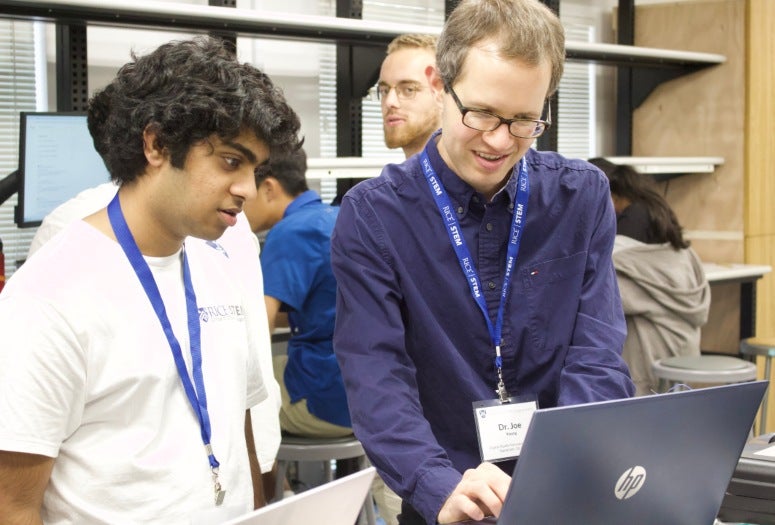⎯ By Debbie Heath
Special to Rice News

Early on a Saturday morning, 22 high school students arrived at Rice University ready to innovate and change the future of health care.
The entrepreneurial-minded students, part of a select summer cohort recognized for their exceptional projects and ideas developed in the Digital Health Young Scholars program, returned to campus this fall with an exclusive invite to take part in the Innovator Spotlight workshop. The Digital Health Young Scholars program, a three-week summer experience hosted by Rice’s Office of STEM Engagement (R-STEM), introduces 10th and 11th grade students to digital circuitry, computer science, physics and engineering research.
“I am always amazed at the work and progress these students accomplish in the Digital Health Young Scholars program, especially with so little time they have in the summer,” said Brittany Templeton, R-STEM assistant director of computer science and mathematics. “Their only complaint always seems to be that they wish they had more time and money to finish their projects.”
Two years ago, the university’s catalyst for STEM education, R-STEM, received numerous inquiries from students in the Digital Health Young Scholars program who were eager to find ways to continue their entrepreneurial projects long after summer had ended. The overwhelming interest from students inspired Templeton to spearhead R-STEM’s Innovator Spotlight, a one-day, postsummer workshop offering mentorship and materials needed to help students take their projects to the next level. In this workshop, students have the support and additional resources needed to empower them to focus on innovation and execution, which Templeton said “makes all the difference.”
Over the years, Templeton has worked alongside Joseph Young, assistant teaching professor of electrical and computer engineering at Rice, and Christopher Franklin, Fort Bend ISD fundamentals of computer science teacher. Together they have taught the Digital Health Young Scholars program; with the Innovator Spotlight, they are taking their investment in STEM education one step further by leading and cultivating the next generation of change innovators.
Young says he became involved with R-STEM’s summer programs because he wanted to show high school students the possibilities within electrical and computer engineering and their potential impact in the world, particularly with regard to important health issues. He was not expecting students to be so deeply vested in their work.
“I was surprised to see how engaged and self-motivated students are despite this program and the workshop not being for a grade,” Young said. “It is wonderful to see how they fall in love with the program and push forward because they are genuinely interested.”

Throughout Innovator Spotlight, Young and Franklin volunteered to mentor their protégés with the help of other instructors. Together they harnessed students’ passions to create digital health devices aimed at making a difference with real-world applications. Some students designed devices to locate Alzheimer’s patients in the event of becoming disoriented or lost, while others developed prototypes to detect safe drinking water conditions. All of the projects, while varied in design, scope and purpose, shared a common goal: to create a low-cost solution with the potential to positively impact underrepresented populations in the digital health care space.
“After witnessing the transformative effects of the first summer cohort where students grew and achieved what they once thought impossible, I knew we had something special,” said Franklin, adding that both the summer program and its sequel “spotlight” workshop are a testament to the success of these programs that help students surpass their own expectations. “Seeing just how far students can go when given the proper support and challenges is remarkable.”
Young said the most impactful part of the program is the revelations students experience and how anything in the world can be learned and applied to problems that they care about. “In just one day they can learn the basics of Python and immediately start analyzing electrocardiogram recordings, for example. I believe the program opens students’ eyes to this new and bold reality,” said Young.
The Digital Health Young Scholars program and the Innovator Spotlight workshop are co-sponsored by Expeditions in Computing and the Precise Advanced Technologies and Health Systems for Underserved Populations Engineering Research Center (ERC) — both funded by the National Science Foundation (NSF). While the goal of all NSF-ERC funded programs is to integrate engineering research and education with technological innovation to transform national prosperity, health and security, the Digital Health Young Scholars program and the Innovator Spotlight workshop at Rice provide opportunities for young students to take part in the mission of NSF-led programs at an early age while offering college-readiness skills.
Seeing the teenagers channel their passion and drive into projects that genuinely aim to improve the world surprised Templeton. “This is not what I was doing at 14 years old,” she said. “The commitment of these students to create positive change, even at such a young age, is inspiring and has renewed my hope for the future.”
Applications for the Digital Health Young Scholars program at Rice will open in early February 2025, followed by invitations for the Innovator Spotlight. High school students interested in developing digital health care solutions for underrepresented populations should submit an online application for consideration.
To learn more about R-STEM student programs, visit rstem.rice.edu.

